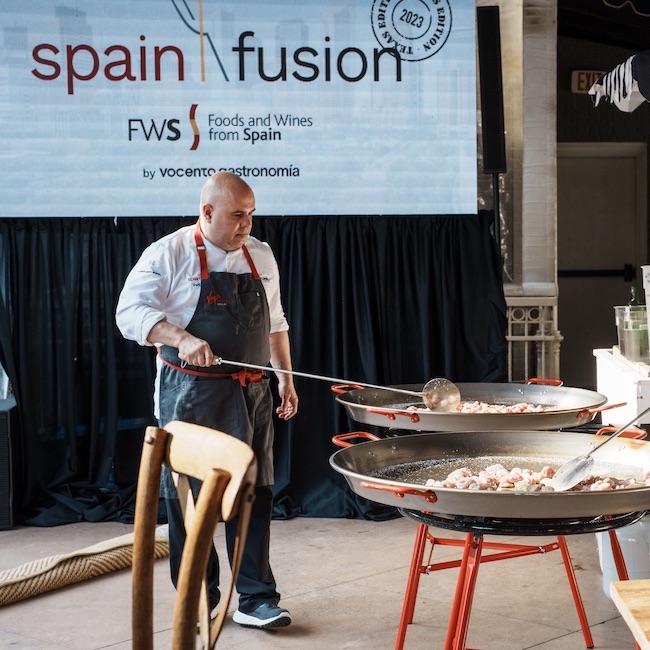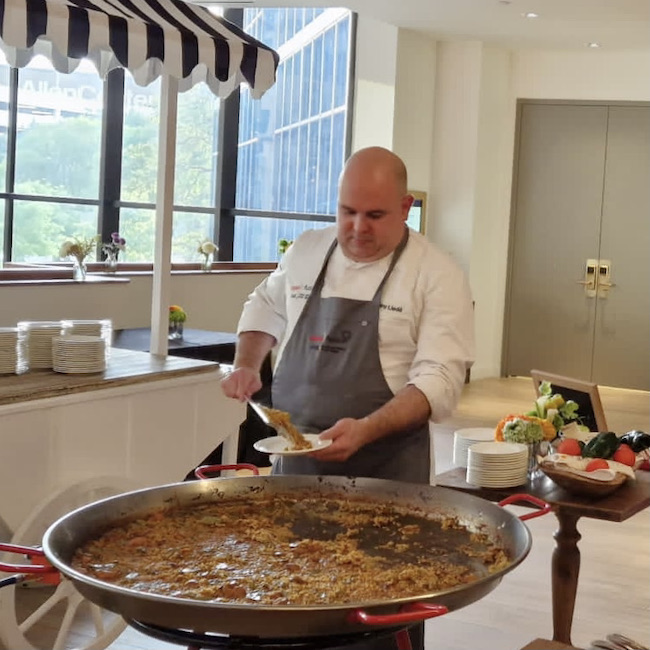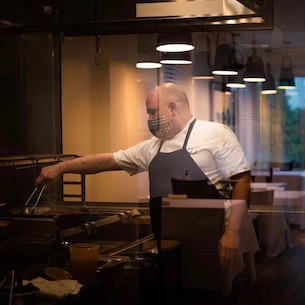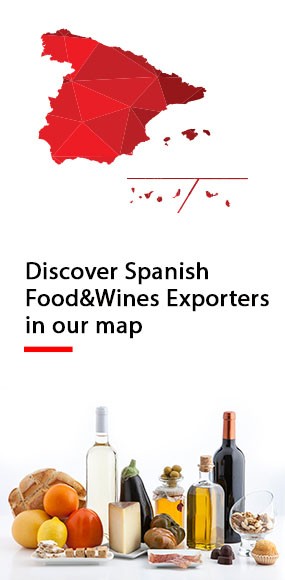.png.transform/rendition-xs/image_image%20(1).png)
Chef Danny Lledó: "The Spanish Cuisine is Incredibly Diverse"
“The secret to making good Spanish food abroad means being consistent and conveying flavours and concepts”
By Esperanza Peláez
Danny Lledó is a rising star on the Spanish culinary scene in the United States. His restaurant, Xiquet (https://www.xiquetdl.com), in Washington DC, earned a Michelin star in 2021, a year after it opened. His parents, María Elena, who is Portuguese, and Isaías, from Denia, met in Maryland. Isaías Lledó had trained as a chef at the Cordon Bleu school in Paris and worked in a number of restaurants there. “Like so many emigrants who worked hard for their children to get a good education, my parents didn’t expect me to go into the restaurant business,” he recalls. Happily, he ended up being bold enough to follow his vocation, although only did so after graduating with a degree in Finance from the University of Maryland, and then working for a few years as a financial consultant.
Danny Lledó never broke ties with his father’s homeland. In addition to spending his childhood vacations in his grandfather'’s vegetable garden and going fishing in his uncle’s boat, the family returned to Spain, living there for two years. That bond – and his love of rice dishes – propelled him to be the most awarded paellero in the United States, but he has also won awards in Spain, such as being a finalist at the Paella Valenciana de Sueca International Competition. When he decided to open a restaurant in Washington, he understood that he had to find his own niche, finding it by delving into his roots. Xiquet – or chiquillo in Valencian, means local boy – pays tribute to Valencian tradition as it is a gastronomic and oenological restaurant. In addition to the Michelin star, awarded in 2022, the Red Guide named him Sommelier of the Year in the United States.

Danny Lledó is an ambassador for Spanish products and cuisine at Spain Fusión Texas Food and Wines from Spain. He is responsible for introducing American professionals in the sector to the world of top-quality canned foods, and also for preparing a Valencian paella that drew applause from even the staunchest paella purists.
You came to the hospitality industry in 2012, and nine years later had already earned a Michelin star.
“I’m the son of emigrants. My father is from Denia and my mother is Portuguese. They both worked in this sector, but of course, that’s the dream that all migrants have, which is to work hard to give their children the chance to go to university. Neither they nor I thought I’d end up working in the restaurant industry like them.”
It took you a while to take that step.
“Yes, I graduated and worked as a financial consultant for three years. Then, I began consulting for small companies, and many of my clients were in the restaurant industry. I kept brushing aside my own desires because I did’t want to disappoint my parents, but in the end I decided to go for it and have tried to do it as well as possible.
How old were you when you stepped into the kitchen?
“I’ve been in professional kitchens since I was very young because while I was studying I was already working in a restaurant. I must have worked somewhere between 30 and 50 hours since high school until I graduated from university. That’s where my passion for cooking began. I worked in a few French restaurants, then in some belonging to José Andrés. When I finished university, I focused on being a financial consultant, but then I did a U-turn and returned to the kitchen.”
That was in 2012, but I didn’t open Xiquet until 2020.
“My first restaurant was a wine bar with a fine-dining tasting menu that was affordable. Next, I joined a company and together we opened another wine bar in Washington DC. Thanks to these wine bars I discovered the world of pairing, and from working with wine and having an emotional bond with Valencian cuisine, the idea for Xiquet emerged.”
Do you feel somewhat like a native Spaniard when it comes to Spanish cuisine?
“Yes, and that’s given me the freedom to convey all those memories to Xiquet and to create something more personal. That and the awards as a specialized rice cook. At Spain Fusión events I’m very much of a purist when it comes to preparing paella. At Xiquet we’re a bit more avant-garde and offer a more personal twist. For example, I do a crab and mushroom rice that I make with local produce, but at the same time it’s a rice dish that my grandmother and all my uncles and aunts in Denia would love because the key flavours are there. Xiquet’s menu is seventy percent Valencian cuisine featuring Spanish products and fifteen percent classic cuisine, but I also include ingredients from here because as much as I would like to, bringing in lettuce or tomatoes from Valencia with the freshness needed is impossible, and because if I have fantastic crab in Maryland, I don’t have to bring it from the Region of Valencia either. The secret to making good Spanish food abroad means being consistent and conveying flavours and concepts.”

There are foodstuffs, like rice, saffron and spices, that you bring in from Spain. What’s it like sourcing ingredients?
“Well, I’ve been a hospitality entrepreneur and business owner since 2012, and in that time we’ve made a lot of effort, but the distribution channels have also improved. Part of the job of a chef is to always be on the lookout for the best foodstuffs, I'm still looking for distributors in Spain of new products.”
Have you come across anything new at Spain Fusión?
“Quite a few things. For example, I already buy Ibérico meats, but at Spain Fusión I was able to make contacts to get 100% acorn-fed Ibérico pork. When it comes to wine, I talked a lot with Fernando Mora about projects, trends, and even collaborations with wineries to make special paired menus, because something I’ve always done and love to do, is to find the chemistry between food and wine.”
Singular Spanish wines offer great quality for fine-dining restaurants and at very reasonable prices.
“Without a doubt. In our case, the 14-course menu costs $265, and we offer a high-end wine pairing for $220. The thing is, if a wine pairing in that category were to feature wines from France or California, the price would skyrocket. Every diner who chooses the wine pairing in our restaurant leaves delighted, because they’ve enjoyed the best that the wine world has to offer at a much more affordable price. And yes, I do have Vega Sicilia Único, I have Pingus and other well-known wines from Spain for whoever wants them, but we have other excellent wines that are incredible value for money, and I speak from experience as I’ve owned wine businesses.”
What do we Spaniards need to do to successfully compete in the hospitality industry in the United States?
“You have to consider many factors. What kind market you have and what already exists in the city where you are, what you are good at, what restaurant format you want and what type of clientele you’re targeting. Xiquet only has six tables. We started with more, but had to downsize during the pandemic and that was key for developing the concept well, because you can’t work the same way in a 24-seat restaurant as you do in a 200-seat restaurant. You have to work out how to hook the public, and it’s not just about the food offering, but the cocktail and wine offerings as well. You have to decide if you’re going to be a wine bar or a bistro, if you’re going to do tapas or full servings, if you’re going to do an à la carte menu, a set menu or a tasting menu. In my case, living in Washington alongside chefs as great as José Andrés or restaurants like La Taberna del Alabardero, which already comprehensively cover the concept of Spanish gastronomy, I concentrate on the concept of Valencian cuisine. I set out to tell a story that has never been told before, and I do it at a pretty high level. It’s important to look at the market, see what’s already out there and what you can be a benchmark in.”
What about taste, the way you present your dishes?
“The important thing is to offer a menu that people can understand and at the same time not be afraid to be yourself. You have to run a business and the books have to balance, but you must try not to chicken out. Usually, diners come to my restaurant without a clue about Valencia, but they see that we cook meat, some fish and that it looks like it might be interesting. With that, you’ve found your customers. You have to strike a balance between what diners can recognize and what Spanish food is. The great challenge Spanish cuisine faces is explaining that Spain is incredibly diverse.”

What does Spain Fusión bring to the table when it comes to introducing Spanish gastronomy to this market?
“First of all, I believe that explaining EVOOs is very important, because Spain is the world leader and it’s not talked about. Ibérico ham is undoubtedly the best product that exists in its category, and in fact even the top Italian and French restaurants in the United States serve it. But it’s also interesting for people to see the diversity of our cheeses and to explain their distinctive characteristics, which have nothing to be ashamed of when compared to Italian or French ones. Manchego cheese is well known here, but we don’t just have Manchego cheese, and also, there are different qualities of Manchego. In other words, what Spain Fusión does is to pass on knowledge and experience. Spain Fusión consists of a wide range of Spanish gastronomic products that are presented and explained so that customers can decide what they need.”
You’ve had to talk about canned foods in a market that sees them as something cheap and not necessarily of good quality.
“Canned foods might need to be present at more events before people realise that it is a quality product. The talk we gave centred on explaining that canning in Spain has a long tradition, that we have brought products that are the result of artisanal, sustainable fishing and are very well produced. Mussels in escabeche are found in thousands of restaurants throughout Spain and in Spanish restaurants in the United States. There are things that people can understand and think, hey, I can use this. But for other foodstuffs to be accepted you have to persist, because doors don’t swing open in a day.”
Xiquet is a celebrated restaurant in the United States. What has the Restaurants of Spain certification brought you?
“Most of all, it’s brought me in closer contact with Spain. It’s brought me a lot of good things, from going to Madrid Fusión to taking part in training programmes or trips to meet producers. It’s one thing to taste the products and another thing to be taken to meet the producers, to see how they work and to talk with them. When you experience it yourself, you tell the story better. It’s also enriched me a lot to join this international community of chefs of Spanish cuisine; it’s enriched me a lot to exchange views with them, in addition to the opportunity to live here with Spain Fusión colleagues. This hasn’t been done in other chefs’ communities around the world, and from that standpoint I feel very lucky.”

